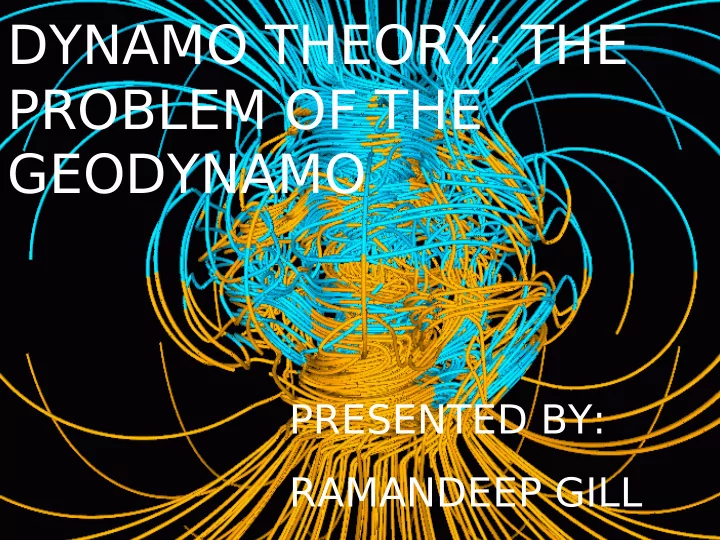

DYNAMO THEORY: THE PROBLEM OF THE GEODYNAMO PRESENTED BY: RAMANDEEP GILL
MAGNETIC FIELD OF THE EARTH • DIPOLE Field Structure Permanent magnetization of Core ? 80% of field is dipole 20 % is non-dipole 2) FIELD AXIS not aligned with rotation axis θ = 11 ° Pole separation
MAGNETIC FIELD OF THE EARTH 3) SECULAR VARIATION Magnetic field does not have the same intensity at all places at all times 4) FIELD POLARITY REVERSAL Field polarity reverses every 250,000 yrs. It has been 780,000 yrs. until the last reversal. Is another reversal Observations: 10% decrease in happening soon ? field intensity since 1830s
QUESTION STILL REMAINS ] O Is the permanent magnetization responsible for N [ Earth’s magnetic field ? From Statistical Mechanics we know: Curie point temperature of most ≈ T c 1000 K ferromagnets ≈ 4200 T core K Core temperature of Earth At high temperatures ferromagnets lose their magnetization
DYNAMO THEORY Branch of magnetohydrodynamics which deals with the self- excitation of magnetic fields in large rotating bodies comprised of electrically conducting fluids. Earth’s Core: Inner Core: ≈ R 0 . 19 R ⊕ Inner Core Iron & Nickel Alloy Outer Core: ≈ R 0 . 55 R ⊕ Outer Core Molten Iron and admixture of silicon, sulphur, carbon
REQUIREMENTS FOR GEODYNAMO 1) CONDUCTING MEDIUM Large amount of molten iron in outer core: comparable to 6 times the volume of the Moon 2) THERMAL CONVECTION •Inner core is hotter than the mantle •Temperature difference results in thermal convection. •Blobs of conducting fluid in outer core rise to the mantle •Mantle dissipate energy through thermal radiation •Colder fluid falls down towards the centre of the Earth
REQUIREMENTS FOR GEODYNAMO 3) DIFFERENTIAL ROTATION •Coriolis effect induced by the rotation of the Earth •Forces conducting fluid to follow helical path •Convection occurs in columns parallel to rotation axis •These columns drift around rotation axis in time •Result: Secular variation
HOMOPOLAR DISC DYNAMO SETUP •A conducting disc rotates about its axis with angular Ω velocity → I •Current runs through a wire looped around the axis •To complete the circuit, the wire is attached to the disc and the axle with sliding contacts S
HOMOPOLAR DISC DYNAMO Initially, magnetic field is produced by the current in the wire = ˆ B B z This induces a Lorentz force on the disc and generates an Emf = × f mag u B ∫ ⇒ ε = × ⋅ = Ω φ ˆ ( u B ) d r ; u r Ω ∫ = ⋅ B d a π 2 ΩΦ = π 2
HOMOPOLAR DISC DYNAMO Main equation describing the whole setup is: Ω M I dI ε = = + L RI L = Self inductance of wire π 2 dt M = Mutual inductance of Ω dI 1 M = + − Disc 0 R I π dt L 2 R = Resistance of wire Ω t M = − − I ( t ) I exp R π o 2 L π 2 R since the current Ω > System is unstable when increases exponentially M π 2 R Ω = Disc slows down to critical frequency: c M
MATHEMATICAL FRAMEWORK Most important equation in dynamo theory: MAGNETIC INDUCTION EQUATION ∂ B = ∇ × × + η ∇ 2 ( ) u B B ∂ t where η is the magnetic diffusivity Buildup or Breakdown of ∇ × × ⇒ First term: ( u B ) magnetic field (Magnetic field instability) Rate of decay of magnetic η ∇ B ⇒ 2 Second term: field due to Ohmic dissipations
MATHEMATICAL FRAMEWORK Quantitative measure of how well the dynamo action will hold up against dissipative effects is given by the Reynolds number ∇ × × ( u B ) u L ≡ ≈ o R η m η ∇ 2 B u is the velocity scale and L is the characteristic length where o scale of the velocity field > R 1 For any dynamo action m Otherwise, the decay term would dominate and the dynamo would not sustain
KINEMATIC DYNAMO MODEL •Tests steady flow of the conducting fluid, with a given velocity field, for any magnetic instabilities. •Ignores the back reaction effect of the magnetic field on the velocity field. •Does not apply to geodynamo. •Numerical simulations of this model prove important for the understanding of MHD equations. Important Aspects: 1) Differential Rotation 2) Meridional Circulation
KINEMATIC DYNAMO MODEL Differential Rotation: Promotes large-scale axisymmetric toroidal fields Meridional Circulation: Generates large-scale axisymmetric poloidal fields Glatzmaier & Roberts
TURBULENT DYNAMO MODEL •Correlation length scale of velocity field is very small •Based on mean field magnetohydrodynamics •Statistical average of fluctuating vector fields is used to compute magnetic field instabilities. = + = + B B B ' , u u u ' •Fluctuating fields have mean and residual components
PRESENT & FUTURE Reverse flux patches along with magnetic field hot spots revealed by Magsat (1980) & Oersted (1999). Supercomputer simulations are able to very closely model the Earth’s magnetic field in 3D Laboratory dynamo experiments have started to show some progress. But there are LIMITATIONS ! Success in this field awaits advancements in satellite sensitivity, faster supercomputers, large scale models.
THANK YOU
Recommend
More recommend